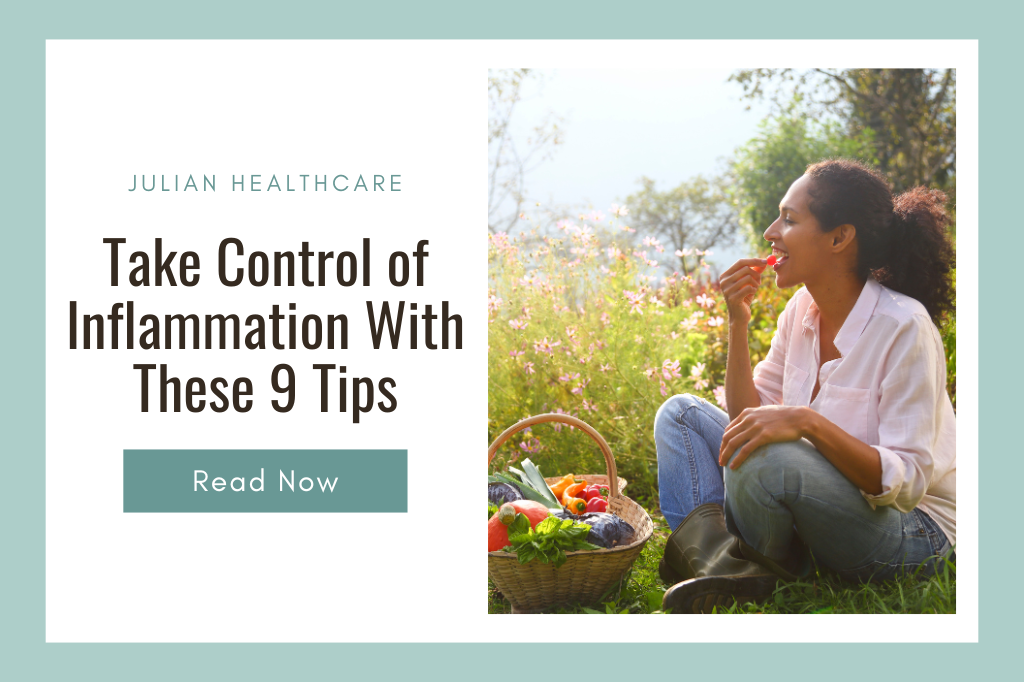Inflammation is an underlying factor behind an endless number of diseases. These include inflammatory conditions of the skin (psoriasis, eczema), gastrointestinal tract (Crohn’s disease or diverticulitis), and musculoskeletal system (back or joint pain), to name a few. It is possible to take control of inflammation, keep reading to learn how!
A certain degree of inflammation is healthy and is a necessary component of the immune defense system. Tissue injury or distressed cells trigger an immune response. Specific immune cells help eliminate infectious agents, trauma, or other causes of damage and repair the damaged cells and tissue.
When optimally balanced, your body provides enough immediate action to promote healing, then down-regulates the response when the threat is gone. When immune imbalances occur, your body shifts toward a state of chronic inflammation. This may present as a minor headache, or as something more severe, such as arthritis.
Inflammation in the body not only manifests as pain and disease, it signals the HPA axis to release cortisol as an attempt to reduce that inflammation. If the inflammatory process persists, a vicious cycle is created involving constant activation of the immune and stress response systems by one another. Dietary and lifestyle considerations can shift the body from a pro-inflammatory to a balanced and non-inflamed state. This will help reduce the inflammatory fire and aid in reducing the overall burden on your stress response system. Keep reading for lifestyle changes you can begin implementing to improve inflammation.
Improve Inflammation With Lifestyle Changes
- Reduce the consumption of inflammatory foods. Foods that promote inflammation include highly processed foods, refined carbs, added sugars, and fried foods. Instead, opt for whole foods in their unadulterated form (such as fruits, veggies, nuts, and seeds).
- Maintain healthy vitamin D levels. Your body synthesizes bioactive vitamin D when it is exposed to natural sunlight. Supplementing with vitamin D3 will also help you maintain a healthy blood level of vitamin D, which helps reduce inflammation and boost the immune system.
- Add anti-inflammatory herbs and spices to your meals. There are numerous herbs and spices that contain naturally occurring anti-inflammatory components. For example, the spice turmeric is known for its strong anti-inflammatory activity. Other anti-inflammatory herbs and spices include ginger root, garlic, basil, parsley, rosemary, curry, cayenne peppers/chilies, thyme, oregano, cinnamon, cloves, and mint.
- Increase your intake of omega-3 fatty acids. Omega-3 fatty acids, particularly the EPA (eicosapentaenoic acid) component of omega-3s, significantly reduce inflammation in the body. A high-quality fish oil or flax seed oil supplement is an excellent concentrated source of omega-3s. Foods high in omega-3 fatty acids include salmon, mackerel, tuna, herring, and sardines. Excellent vegetarian sources of omega-3 fatty acids include ground flax seeds, chia seeds, hemp seeds, sesame seeds, walnuts, and Brussels sprouts.
- Maintain gastrointestinal health. Chronic inflammation often originates in the GI tract. Avoiding food allergens and supplementing with digestive enzymes and probiotics will boost GI health. Consuming foods high in fiber and omega-3 fatty acids will also help heal the gut.
- Eat colorful fruits and vegetables. The rich color in fruits and vegetables, such as the blue in blueberries and the red in strawberries, are naturally occurring antioxidants. Increasing your intake of colorful fruits and vegetables will naturally boost your antioxidant levels, resulting in a reduction in free-radical damage and inflammation throughout the body.
- Engage in regular, cardiovascular activity (at least four days per week). Fat cells in your body produce and secrete inflammatory compounds. Abdominal fat cells produce and secrete these compounds at even higher levels, resulting in a strong inflammatory response for those who have accumulated extra belly fat. Getting regular physical activity can help you burn extra fat and reverse this inflammatory process.
- Get adequate amounts of sleep. Disruption of normal sleep can lead to daytime elevation in pro-inflammatory molecules. Aim for seven to eight hours of sleep each night. If you are suffering from insomnia, please read this blog post for tips to improve your sleep cycle and reduce inflammation.
- Avoid toxin exposure as much as possible. This includes smoking, environmental pollution, unfiltered water, cosmetic products, lotions, and household cleaning items that contain unnatural ingredients and harmful chemicals. Reading labels on skin care products is as important to your health as reading food labels. Using natural, organic skin care products, cosmetics, detergents, and cleaning products will significantly reduce exposure to harmful, pro-inflammatory, and often carcinogenic chemicals.
Targeted Supplements
When it comes to managing inflammation, targeted supplementation can be highly effective. Orthomega® 820 and Turiva® are two standout products from Orthomolecular that specifically target inflammatory processes in the body. You can find these supplements on Fullscript, an online supplement dispensary.
Orthomega® 820 is a high-concentration fish oil derived from the pristine waters off the Chilean coast. Each soft gel provides 820 mg of eicosapentaenoic acid (EPA), docosahexaenoic acid (DHA), and docosapentaenoic acid (DPA) in re-esterified triglyceride form, ensuring superior absorption. These omega-3 fatty acids are essential for cardiovascular health, brain function, and maintaining a healthy inflammatory balance, making Orthomega® 820 a vital supplement for many individuals.
Turiva® offers a unique blend of bioactive phytonutrients that form the Complete Turmeric Matrix. This blend includes curcumin, turmerin protein, turmerone oil, β-elemene, curdione, bisacurone, and calebin A, creating a comprehensive, immune-boosting turmeric supplement. Turiva® supports normal inflammatory input, strengthens immune reserves, and targets various proinflammatory markers while also promoting healthy breathing, cognitive function, gut health, and overall immune function.
Incorporating targeted supplements like Orthomega® 820 and Turiva® into your wellness routine can significantly aid in managing inflammation and supporting overall health and well-being. At Julian Healthcare, we can help you find a supplement routine customized to your specific health needs.
Take Control of Inflammation With a Multifaceted Approach
Taking control of inflammation involves a multifaceted approach that encompasses dietary choices, lifestyle adjustments, and a personalized healthcare approach. By reducing the consumption of inflammatory foods, incorporating anti-inflammatory herbs and spices, and increasing omega-3 fatty acids, you can positively impact your body’s inflammatory response.
Additionally, maintaining healthy habits such as regular exercise, sufficient sleep, and minimizing toxin exposure are crucial steps in achieving a balanced and non-inflamed state. Remember, small changes can lead to significant improvements in managing inflammation and promoting overall well-being. Embracing these tips empowers you to take charge of your health and live a vibrant, inflammation-free life.
If you’re ready for a new approach to healthcare, schedule a discovery call with Julian Healthcare today. We are currently accepting new patients!


